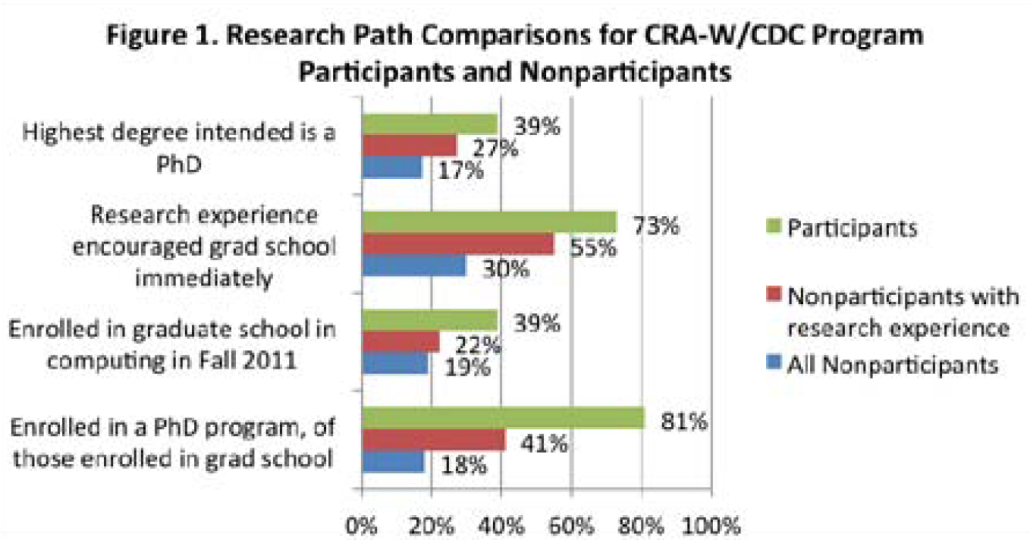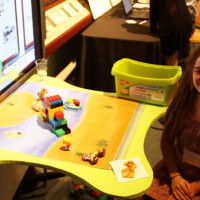First Results from the Data Buddies Project
By Betsy Bizot
Originally Printed in the Winter/Spring 2012 Newsletter
In the Winter-Spring 2011 newsletter, we told you about the Data Buddies project that had recently been funded by NSF as part of our evaluation efforts. The main goal of Data Buddies is to gather data on students who do not participate in our Broading Participation in Computing (BPC) Alliance programs so that we can compare participants to non-participants to demonstrate the value of our programs. In addition, Data Buddies has the potential to provide a significant national resource for knowledge about the educational experiences and career decisions of undergraduate and graduate students and faculty in computing, with an emphasis on data that are useful in encouraging promising students toward research careers and promoting their success. In spring 2011, we surveyed completing undergraduate and graduate students at 46 departments plus past participants of CREU, DREU, CMW, and Grad Cohort who were finishing degrees in the same time frame. We received survey responses from 706 undergraduates, including 41 program participants, and from 555 graduate students, including 60 program participants. The key finding from the undergraduate survey was that CREU and DREU participants were significantly more likely to be on a research track – not just more likely than the total group of non-participants (many of whom have no interest in research or graduate school), but also more likely than non-participants who had undergraduate research experiences other than CREU or DREU.
Figure 1 shows the impact of program participation through-out the decision to attend graduate school. Participants are more likely to say that their highest intended degree is a PhD, more likely to say that their research experience encouraged attending graduate school immediately after finishing an undergraduate degree, more likely to be enrolled in graduate school for the fall following their graduation, and if in gradu-ate school, more likely to be enrolled in a PhD program.
From the graduate surveys, we learned that participants seem to have stronger professional networks than nonparticipants. When rating their knowledge of strategies for developing professional networks, 87% of participants completing PhDs rate themselves as knowing “some” or “quite a bit” compared to 67% of nonparticipants. Furthermore, they put this knowledge into action. About 71% of Ph.D. participants (vs. 37% of nonparticipants) served on a departmental, conference, or professional society committee at least once in their graduate careers, and 64% of participants report conferences as a significant source of job information, compared to 31% of nonparticipants.
Participants completing master’s degrees are more likely than nonparticipants to be continuing directly to another degree program in computing (27.5% vs. 13.5%). Also, master’s participants found their professional networks more useful than nonparticipants while job hunting: twice as many found their advisors and persons within their department useful (54% vs. 26%) and almost twice as many found their professional networks outside their department useful (92% vs. 48%).
In fall 2011, we surveyed continuing graduate and undergradu-ate students at 50 departments; we received responses from 2329 undergraduates and 1260 graduate students. Results are currently being analyzed. A faculty survey is under development for use with faculty at Data Buddy departments, past program participants who are currently faculty, and mentors of CREU and DREU students. This survey will address two main topics. First, we will look at the teaching, research, and service activities of the faculty themselves to evaluate the effectiveness of our mentoring programs in preparing faculty for career success. Second, we will look at faculty as mentors of undergraduate research.
In September 2011, the Data Buddies results contributed to a highly successful site visit for our BPC program. The Site Visit team identified two primary areas for improvement in the pro-gram: (1) Data Buddies should include more minority-serving institutions, and (2) We should quantify the particular program aspects of CREU and DREU that are resulting in better outcomes for participants. For the first item, the fall surveys already included two HBCUs and one Hispanic-serving institution that had not participated in the spring, and with the help of CDC board members we continue to recruit departments from minority-serving institutions. For the second, a key section of the fall undergraduate survey asked students who had a research experience the previous summer (CREU, DREU, or others) many questions about the experience: what they did, how they interacted with their mentor, who else they worked with, how satisfied they were with aspects of the program. We look forward to seeing the results.
We expect Data Buddies to continue and to grow. We are applying for additional NSF funding as part of our general BPC extension proposal. Following a presentation at the NSF CE21 PI meeting in February, representatives from several departments, an REU program, and another BPC Alliance approached us about participating in Data Buddies. The Computing Research Association Education Committee, CRA-E, is looking forward to seeing our information about REU participation. We welcome inquiries about collaboration; email databuddies@cra.org or Betsy directly at bizot@cra.org.







